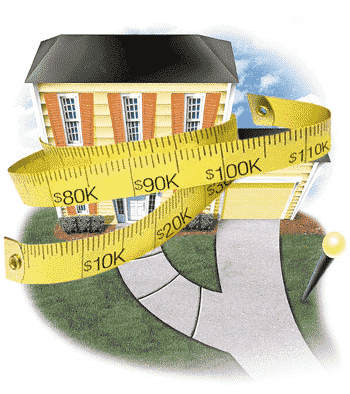By William Bronchick, Real Estate Mentor
In real estate investing, to evaluate a property, some people look at appraisals, others look at the tax assessor’s value, and others say that a house is worth what someone will pay for it. Further confusing the issue, we can look at the income the property generates or the insurance replacement value. In some cases, the land is worth more than the house itself and any improvements are ignored.
All these factors have importance when you value property so we’ll discuss how to apply each factor and in which circumstances. Keep in mind that valuation is more of an art than a science, but by using a few formulas and practicing them, you can learn to value any property correctly.
Warning! Don’t ask the person who has a stake in the property! The worst way to find out a home’s value is to ask someone who has an interest in the deal. For example, asking the listing real estate broker for advice on what the property is worth is like asking your barber, “How’s my haircut?” In both cases, they’ll tell you what they think you want to hear. A bad deal burns many novice investors because they trusted someone for advice and that person was biased by the potential profit of the deal. Such is the real estate investing buisness.
Location, location.
This factor is extremely important when you’re comparing sold properties. A professional appraiser typically looks at houses in the same subdivision and so should you. In the case of a subdivision where the houses are all similar and built in the same time period, you only need to compare similar houses with similar styles to get an accurate valuation. If there’s a wide mix of properties in the subdivision, you may need to go outside of it to get comparable sales, but be careful with “dividing lines.” Geographic dividing lines such as different sides of the river, the park, or the main highway may put the property in another school district and may not give you accurate comps.
Below-Ground Space
While finished basements can add value, the amount of value is less than it is for above-ground living areas. In addition, this greatly varies depending on different regions of the country. In humid areas, below-ground living space isn’t as valuable to homeowners as in dryer areas of the country. Thus, the American National Standards Institute (ANSI) uses above-ground construction as the national standard for comparing values. Sometimes homeowners refinish basements (or add other space) without obtaining proper building permits from the county. Be sure to check public records to see if the finished square footage represented by the seller matches the county’s file.
Bill’ s Advice: Know the Local Laws: A client rented an illegal basement apartment to a woman who had stopped paying rent. We filed for an eviction in court for nonpayment of rent, but the judge dismissed the case. He said my client wasn’t legally permitted to collect rent in the first place! In some parts of the country, added or renovated space requires a certificate of occupancy from the local building department before you can close on the sale of the home. In other areas, this sort of thing is overlooked. In short, get to know what’s customary in your area.
An added note that having a real estate attorney, real estate coach, or real estate mentor on your team can pay dividends!
